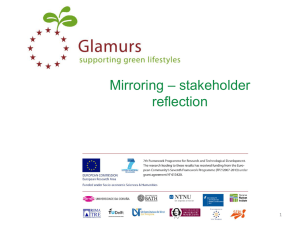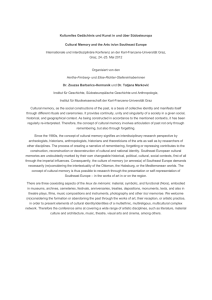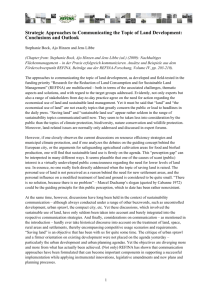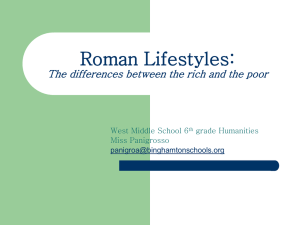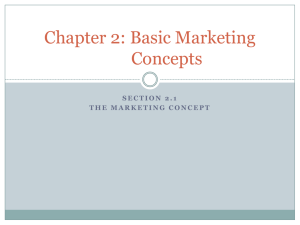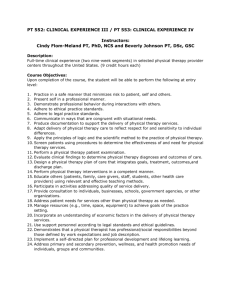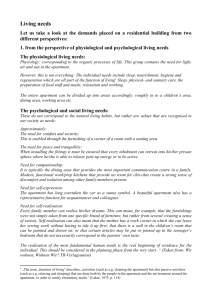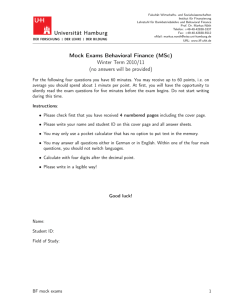Title: Lifestyles and sustainability issues in young
advertisement
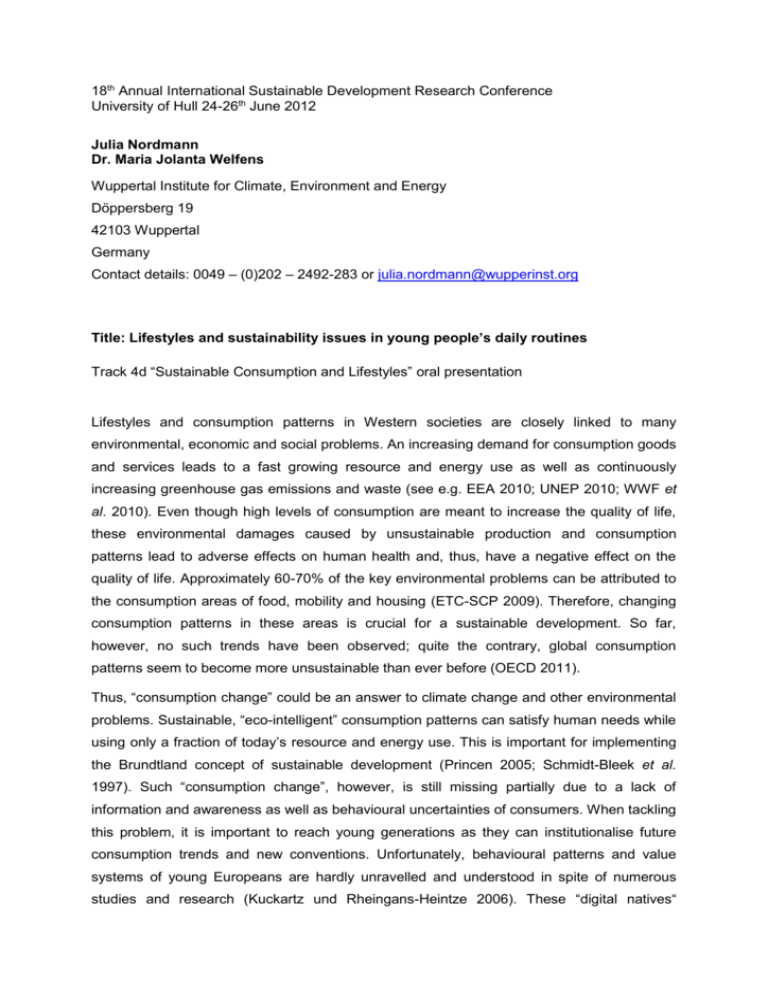
18th Annual International Sustainable Development Research Conference University of Hull 24-26th June 2012 Julia Nordmann Dr. Maria Jolanta Welfens Wuppertal Institute for Climate, Environment and Energy Döppersberg 19 42103 Wuppertal Germany Contact details: 0049 – (0)202 – 2492-283 or julia.nordmann@wupperinst.org Title: Lifestyles and sustainability issues in young people’s daily routines Track 4d “Sustainable Consumption and Lifestyles” oral presentation Lifestyles and consumption patterns in Western societies are closely linked to many environmental, economic and social problems. An increasing demand for consumption goods and services leads to a fast growing resource and energy use as well as continuously increasing greenhouse gas emissions and waste (see e.g. EEA 2010; UNEP 2010; WWF et al. 2010). Even though high levels of consumption are meant to increase the quality of life, these environmental damages caused by unsustainable production and consumption patterns lead to adverse effects on human health and, thus, have a negative effect on the quality of life. Approximately 60-70% of the key environmental problems can be attributed to the consumption areas of food, mobility and housing (ETC-SCP 2009). Therefore, changing consumption patterns in these areas is crucial for a sustainable development. So far, however, no such trends have been observed; quite the contrary, global consumption patterns seem to become more unsustainable than ever before (OECD 2011). Thus, “consumption change” could be an answer to climate change and other environmental problems. Sustainable, “eco-intelligent” consumption patterns can satisfy human needs while using only a fraction of today’s resource and energy use. This is important for implementing the Brundtland concept of sustainable development (Princen 2005; Schmidt-Bleek et al. 1997). Such “consumption change”, however, is still missing partially due to a lack of information and awareness as well as behavioural uncertainties of consumers. When tackling this problem, it is important to reach young generations as they can institutionalise future consumption trends and new conventions. Unfortunately, behavioural patterns and value systems of young Europeans are hardly unravelled and understood in spite of numerous studies and research (Kuckartz und Rheingans-Heintze 2006). These “digital natives“ (Schipperges, 2010: 292) has integrated mobile phones, computers, iPods etc. in their daily life, thus, having different access to information and communication patterns than generations of the same age ten to fifteen years ago. They take issues such as globalisation, web2.0 and new technologies for granted as part of their life. Television and new media, such as web2.0, have picked up the issue of sustainability in recent years (Glathe 2010; CSCP 2009; Rat für Nachhaltigkeit 2004). These mass media can help to shape environmental-friendly thinking and behavioural patterns, etablishing and institutionalising social norms. Based on this, the Wuppertal Institute for Climate, Environment and Energy and the German TV station ‘ProSieben’ started a project for gaining insight into consumption patterns and lifestyles of young generations as well as their knowledge and awareness of sustainability issues. An online-survey was conducted focussing on sustainability issues and environmental impacts of consumption; central themes were food, mobility, energy issues and luxury perceptions. The questionnaire titled ‘How eco are you?’ was distributed via different ProSieben channels as well as facebook and twitter in order to reach a large number of people between the age of 14 and 29 in Germany, Austria and Switzerland. Due to the distribution methods, this was not a representative survey, however, the high response rate provided us with a substantial data set. After cleaning the data, we were left with 30,434 Germans of the targeted age group, giving a good indication on the attitude and knowledge of young adults regarding environmental issues and sustainability as well as their lifestyles and consumption patterns. Overall, the results show relatively high levels of awareness and knowledge of climate change and environmental issues among young adults. The majority of respondents expect intensified resource and water conflicts in the future, more than half of all respondents anticipate adverse effects on their life due to climate change. Approximately half of all adolescents link their lifestyles with environmental problems; the others see not connection between their consumption patterns and the environment. Almost 80% of all respondents do not believe that the environmental problems will be solved within the next 30 years. During the analyses of the data, other similar studies were taken into account comparing the results with each other; such pessimistic perception could be found in other studies as well, however, the numbers were slightly lower. References: Bundesministerium für Umwelt, Naturschutz und Reaktorsicherheit und Umweltbundesamt (2010): Umweltbewusstsein in Deutschland 2010. Ergebnisse einer repräsentativen Bevölkerungsumfrage. Heidelberg, Potsdam. Online: www.umweltdaten.de/publikationen/fpdf-l/4045.pdf (March 2011). Deutsche Shell Holding GmbH (Hrsg.) (2010): Jugend 2010. 16. Shell Jugendstudie. Frankfurt am Main: Fischer Taschenbuchverlag. Online: http://www.shell.de/home/content/deu/aboutshell/our_commitment/shell_youth_study/contact/ (March 2011). EEA (2010): The European environment — state and outlook 2010: Synthesis. European Environment Agency, Copenhagen. ETC-SCP (2009): Environmental Pressures from European Consumption – A study in integrated environmental and economic analysis, ETC/SCP working paper 1/2009, Copenhagen, European Topic Centre on Sustainable Consumption and Production. Europäische Kommission (2007): Einstellungen der europäischen Bürger zur Umwelt. Bericht. - Spezial Eurobarometer 295/ Wave 68.2. Online: ec.europa.eu/public_opinion/archives/ebs/ebs_295_de.pdf (March 2011). Kuckartz, U. und Rheingans-Heintze, A. (2006): Trends im Umweltbewusstsein. VS Verlag für Sozialwissenschaften, Wiesbaden. OECD (2011): Greening Household Behaviour. Organisation for Economic Co-operation and Development, OECD Publishing. Princen, T. (2005). The Logic of Sufficiency. Cambridge University Press, Cambridge. Schipperges, M. (2010): vhw-Milieus 2010, in vhw FWS 6/Dezember 2010, 285-293 Schmidt-Bleek (2009): The Earth. Natural Resources and Human Intervention. London. Schmidt-Bleek, F.; Merten, T.; Tischner, U. (1997): Ökointelligentes Produzieren und Konsumieren, Wuppertal Texte. S. 82–104. Basel, Birkhäuser Verlag; Schmidt-Bleek, F. (2007): Nutzen wir die Erde richtig? Die Leistungen der Natur und die Arbeit des Menschen. Frankfurt/M., Fischer Taschenbuch Verlag. UNEP (2010): Assessing the Environmental Impacts of Consumption and Production – Priority Products and Materials, A Report of the Working Group on the Environmental Impacts of Products and Materials to the International Panel for Sustainable Resource Management. Hertwich, E., van der Voet, E., Suh, S., Tukker, A., Huijbregts M., Kazmierczyk, P., Lenzen, M., McNeely, J., Moriguchi, Y. United Nations Environmental Programme 2010. WWF (2010): Zoological Society of London, Global Footprint Network Living Planet Report 2010 (www.wwf.de).
